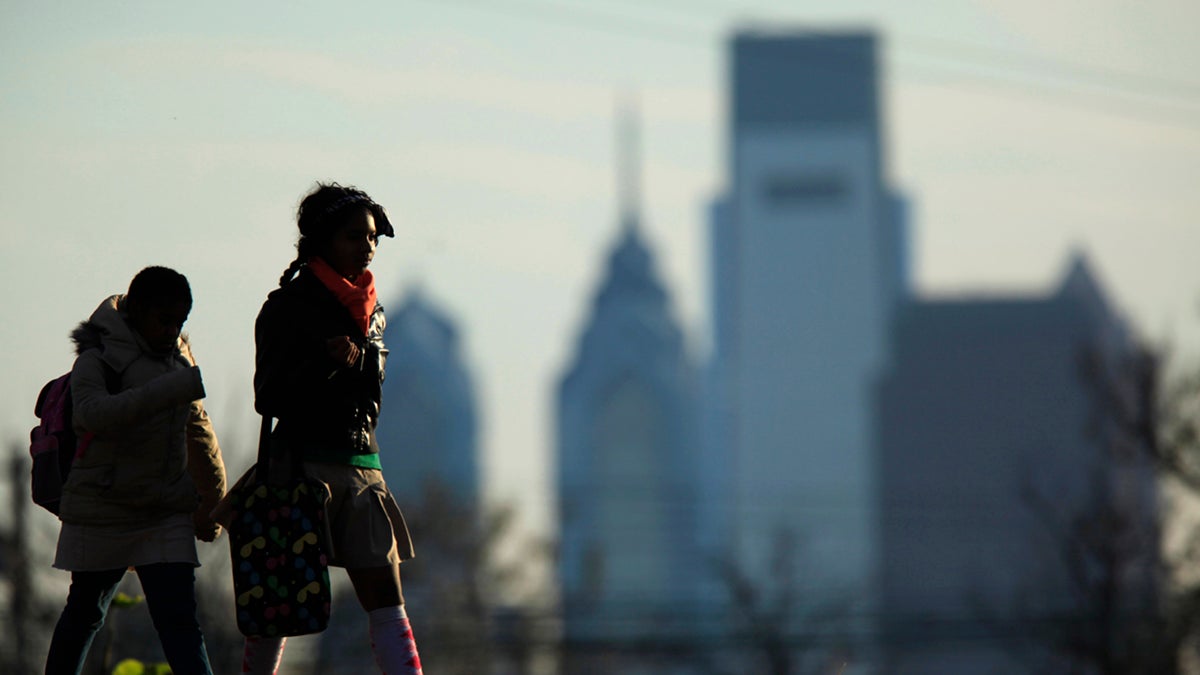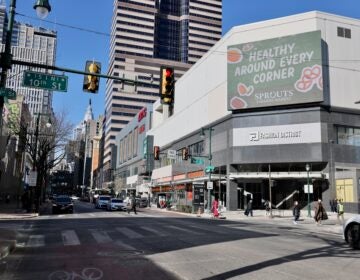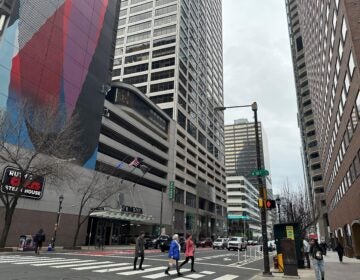Moving toward urban development that benefits all Philadelphians
Is Seattle really a model that Philadelphia wants to emulate?

People walk in view of the city skyline in Philadelphia (Matt Rourke/AP Photo)
When I dropped out of college, my mom, ever the saint, let me move into her small apartment at 23rd and Spruce streets. It was $500 a month, in 1999, heat included. Not great, but decent enough and accessible to everything we needed.
At that time, there were still corners of Philly’s central core with cheap rent. I baby-sat for a woman who had a subsidized apartment down the block from Greenfield Elementary at 22nd and Chestnut streets. She was so grateful to live in Center City so her young kids could go to “a good school.” This was a real example of a mixed-income neighborhood providing a direct benefit to a low-income family.
On Nov. 27, I joined more than 100 Philadelphians at a committee hearing for Maria Quinoñes-Sánchez’s affordable housing bill, which was introduced last summer and revised after talks with community groups and developers. Community members, developers, and the city planning office testified.
At the hearing, Council members and advocates both tried to draw comparisons between Philadelphia and Seattle. The city planning commission is talking with Seattle about its affordable housing plans. But is Seattle really a model that Philadelphia wants to emulate?
Seattle bet on the middle- and upper-income entrepreneurial and innovative “creative class” moving into the city to save its bottom line with property taxes. But it happened at the expense of the working-class population, which was displaced when their neighborhoods became unaffordable.
In 2015, Seattle declared a state of emergency over its homelessness crisis. Seattle recently decided to spend $1.1 million to fence off an area that is a long-term homeless encampment. A recent look at cost of living shows that a single person making $15 an hour cannot live in the city.
Residents are trying to hang on to their place in a city they feel they have no control over. These are not just numbers on a piece of paper. These are people, families, lives that are disrupted. I watched people displaced from their neighborhoods in real time when I lived there in the late 2000s. Can we have development without displacement? Yes, if our elected officials want to make sure that happens.
The Amazon HQ2 search raised awareness about the handouts cities offer to corporations. The idea is that the businesses will create jobs and attract new residents who will pay taxes that will fund programs. Cities then fund projects that make neighborhoods more attractive to this middle class with disposable income. The former residents — who were used in photo-ops as politicians created urban gardens or built a bike path — are pushed out of those neighborhoods. The poor people who built the community assets are not able to enjoy what they have built. The area becomes filled with people who moved in from elsewhere, and gentrifying neighborhoods become bland and inaccessible to people without means.
City Hall faces a real problem. Philadelphia is in an unequal relationship with big business, and it’s utterly dependent on developers to fuel growth. City leaders have given control of the city to the people who will personally benefit from development rather than demanding that increased revenues increase the quality of life for every citizen.
City officials won’t release the full text of the Amazon bid because they “want to remain competitive.” That should worry the citizens of Philadelphia. What are they selling that they don’t want to show us? It seems the city would rather come to the aid of individual developers and corporations than the 25 percent of city residents who struggle with poverty. Developers receive millions in tax breaks every year with the promise of jobs and trickle-down benefits, but we have not yet seen that renaissance in overall quality of life we were promised.
Instead, we are being driven out.
With robust affordable housing initiatives and targeted improvements to public service, we have a chance to use development to benefit everyone. And that’s key. If we can invest in our people, the most important asset of this city, we can become leaders in a people-friendly development initiative. By demanding that developers and corporations pay their full taxes, to pay into the systems that will most benefit our cash-strapped city, we can fully fund our schools, supplement our housing programs, and support citizens coming from back from prison. We need to demand what’s best for all Philadelphians, not just a handful of people who have profited from real estate development.
—
Kitty Heite is a parent, educator, and organizer who lives in West Philly.
WHYY is your source for fact-based, in-depth journalism and information. As a nonprofit organization, we rely on financial support from readers like you. Please give today.




